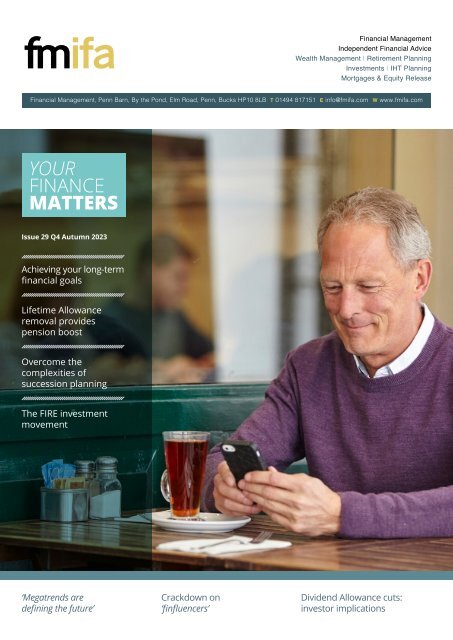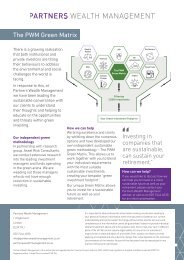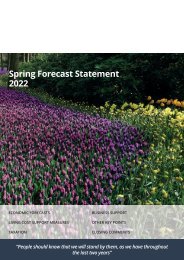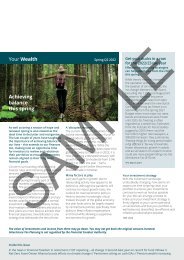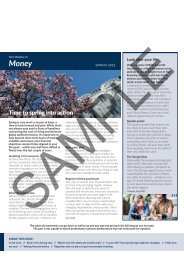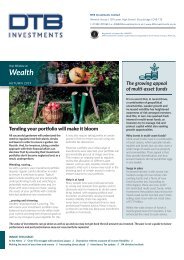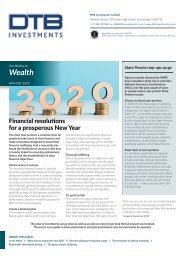FM IFA Your Finance Matters Mag Issue 29 Q4 Autumn 2023
Create successful ePaper yourself
Turn your PDF publications into a flip-book with our unique Google optimized e-Paper software.
fm<br />
Financial Management<br />
Independent Financial Advice<br />
Wealth Management | Retirement Planning<br />
Investments | IHT Planning<br />
Mortgages & Equity Release<br />
Financial Management, Penn Barn, By the Pond, Elm Road, Penn, Bucks HP10 8LB T 01494 817151 E info@fmifa.com W www.fmifa.com<br />
<strong>Issue</strong> <strong>29</strong> <strong>Q4</strong> <strong>Autumn</strong> <strong>2023</strong><br />
Achieving your long-term<br />
financial goals<br />
Lifetime Allowance<br />
removal provides<br />
pension boost<br />
Overcome the<br />
complexities of<br />
succession planning<br />
The FIRE investment<br />
movement<br />
‘Megatrends are<br />
defining the future’<br />
Crackdown on<br />
‘finfluencers’<br />
Dividend Allowance cuts:<br />
investor implications
INSIDE<br />
this issue<br />
Achieving your long-term financial goals 3<br />
Lifetime Allowance removal provides pension boost 4<br />
In the news 4<br />
‘Megatrends are defining the future’ 5<br />
Crackdown on ‘finfluencers’ 5<br />
The FIRE investment movement 6<br />
It’s good to talk 7<br />
Tax punishment on prudence 7<br />
Overcome the complexities of succession planning 8<br />
In other news 8<br />
Dividend Allowance cuts: investor implications 9<br />
Protection – a financial and wellbeing safety net 10<br />
Gender division extends to money matters 10<br />
Understanding your behavioural biases 11<br />
“British pensioners should benefit from British business success” 11<br />
‘Spot the dog’ 12<br />
05 06 11<br />
2 <strong>Your</strong> <strong>Finance</strong> <strong>Matters</strong>
Achieving<br />
your long-term<br />
financial goals<br />
After more than a decade of<br />
putting up with paltry savings<br />
rates, the sharp increase in rates<br />
over the past two years has certainly<br />
brought considerable cheer to savers.<br />
However, while the rise is welcome,<br />
it is important savers do not overly<br />
rely on cash savings but carry on<br />
investing if they are to maximise<br />
returns and achieve their long-term<br />
financial goals.<br />
Think holistically<br />
Although the availability of higher rates<br />
has provided a boost to cash savings,<br />
assessing the appropriate amount to<br />
hold in rainy-day funds is always difficult,<br />
particularly given recent cost-of-living<br />
pressures. However, history suggests<br />
holding too much money in cash can<br />
hold back your future wealth, as returns<br />
on both bonds and equities have a<br />
better long-term record in terms of<br />
outpacing inflation.<br />
History suggests<br />
Holding too much money in cash<br />
can hold back your future wealth, as<br />
returns on both bonds and equities<br />
have a better long-term record in<br />
terms of outpacing inflation<br />
Time in the market<br />
History also suggests long periods out of<br />
the market increase investors’ chances<br />
of underperforming. This is because,<br />
while cash rates may look attractive,<br />
knowing when to sell and buy back into<br />
the market is extremely difficult if not<br />
impossible, particularly when markets are<br />
volatile. The best approach is therefore<br />
usually to stay in the market and build a<br />
portfolio capable of capitalising on any<br />
improved outlook in order to maximise<br />
potential long-term gains.<br />
Don’t be intimidated<br />
Another reason why some people<br />
might shy away from investing is<br />
because they feel overawed. Indeed,<br />
a recent survey 1 found that half of<br />
the UK population admits to being<br />
intimidated by investing, with more<br />
respondents saying it would be easier<br />
to learn a new language than start<br />
investing. On a more positive note,<br />
however, other research 2 recently<br />
showed growth in the uptake of<br />
regulated financial advice, with 4.4<br />
million UK adults seeking advice in 2022,<br />
up from 3.8 million two years earlier.<br />
Here to help<br />
And of course, we’re always here for you;<br />
so, if you need any advice get in touch<br />
and we’ll help you build an investment<br />
strategy focused squarely on your future<br />
dreams and aspirations.<br />
1<br />
Lloyds Bank, July <strong>2023</strong>, 2 FCA, July <strong>2023</strong><br />
The value of investments can go down as well as up and you may not get back the full amount you invested.<br />
The past is not a guide to future performance and past performance may not necessarily be repeated.<br />
<strong>Issue</strong> <strong>29</strong> <strong>Q4</strong> <strong>Autumn</strong> <strong>2023</strong> 3
Lifetime Allowance removal<br />
provides pension boost<br />
Several months have passed<br />
since the Spring Budget, which,<br />
although not necessarily packed<br />
with good news stories, held one<br />
announcement that certainly did<br />
bring considerable cheer to higher<br />
rate taxpayers. A recent survey has<br />
revealed the dramatic impact that<br />
Chancellor Jeremy Hunt’s decision to<br />
scrap the pension Lifetime Allowance<br />
(LTA) is having on people’s retirement<br />
planning strategies.<br />
Purpose of the move<br />
In his first Spring Budget Statement<br />
delivered on 15 March, the Chancellor<br />
announced that the LTA charge would<br />
be removed from April <strong>2023</strong> and that the<br />
LTA would be abolished altogether from<br />
April 2024. This decision was essentially<br />
designed to remove a disincentive<br />
for retirement saving amongst higher<br />
earners and dissuade an increasing<br />
number of this group from retiring early.<br />
Boosting pension contributions<br />
New research 3 suggests the change<br />
has already had a significant impact<br />
on higher earners’ pension saving and<br />
retirement planning decisions both in<br />
terms of spurring more contributions<br />
and encouraging retirement delays.<br />
According to the survey, 51% of higher<br />
rate taxpayers have restarted, increased<br />
or made plans to increase their pension<br />
payments since the announcement, with<br />
average additional payments amounting<br />
to £650 a month.<br />
Extending working lives<br />
In addition, 23% of respondents said they<br />
had delayed their planned retirement or<br />
are likely to delay their retirement due to<br />
the fact that they can now save a higher<br />
amount in their pension pot without<br />
facing a heavy tax charge. Furthermore,<br />
around 10% said they had actually come<br />
out of retirement as a result of the<br />
change, while another 6% were planning<br />
to come out of retirement.<br />
Advice is paramount<br />
While abolition of the LTA has<br />
undoubtedly simplified some decisions<br />
in relation to retirement and estate<br />
planning, it has also effectively increased<br />
the need for clients to seek professional<br />
advice on their pension arrangements<br />
due to the change in tax treatment.<br />
There is also always an element of<br />
political risk in financial planning which<br />
means clients may need to act quickly<br />
if they are to make the most of the<br />
opportunity the Chancellor has provided.<br />
3<br />
Investec, July <strong>2023</strong><br />
In the news<br />
Cost of raising a<br />
child soars<br />
Recent research 4 has found that<br />
the cost of raising a child has<br />
increased by 10% over the last<br />
year, with the average UK family<br />
spending £223,256 in their<br />
offspring’s first 18 years. This<br />
works out at over £12,000 a year<br />
per child. The research looked<br />
at the different costs associated<br />
with bringing up children,<br />
ranging from essential through<br />
to leisure activities.<br />
End to rising wealth<br />
The Resolution Foundation<br />
has found that the cost-ofliving<br />
crisis, coupled with the<br />
monetary policy response,<br />
has put an end to the trend<br />
of rising wealth in the UK.<br />
The independent think-tank<br />
estimates that the wealth-to-<br />
GDP ratio fell to around 650%<br />
by early <strong>2023</strong>. This is by far<br />
the biggest fall on record as a<br />
proportion of GDP, wiping out<br />
£2.1trn of household net worth<br />
in cash terms.<br />
Gender pensions gap<br />
There is still a wide gender<br />
pensions gap – recently<br />
published government data (for<br />
2018–20) shows a gap between<br />
median male and female private<br />
pension wealth of 35% overall.<br />
The size of the gap varies<br />
according to age, with women<br />
aged between 45 and 49 seeing<br />
a 47% chasm relative to men in<br />
the same age group.<br />
4<br />
Moneyfarm, <strong>2023</strong><br />
The value of investments can go down as well as up and you may not get back the full amount you invested.<br />
The past is not a guide to future performance and past performance may not necessarily be repeated.<br />
4 <strong>Your</strong> <strong>Finance</strong> <strong>Matters</strong>
Crackdown on<br />
‘finfluencers’<br />
Influencers who generate content<br />
on financial topics are rapidly rising<br />
in popularity on social media, having<br />
been dubbed ‘finfluencers.’<br />
‘Megatrends<br />
are defining<br />
the future’<br />
The emergence of new trends and advancements<br />
such as the advent of AI, electric vehicles and<br />
other ‘big picture’ global innovations are set to shape<br />
our future, presenting opportunities to investors<br />
interested in capturing these themes in their portfolios.<br />
The United Nations Economist Network have identified<br />
five megatrends impacting social, economic and<br />
environmental outcomes, these are – climate change,<br />
demographic shifts, urbanisation, digital and disruptive<br />
technologies and inequality. The World Economic Forum<br />
have noted that ‘megatrends are defining the future… short-term<br />
investors can be opportunistic, but long-term investors have to<br />
be more strategic, particularly in the face of these megatrends.’<br />
‘Big picture’ global innovations are set to<br />
shape our future, presenting opportunities<br />
to investors interested in capturing these<br />
themes in their portfolios<br />
The good news is that finance is<br />
becoming more accessible and<br />
appealing to younger generations<br />
through bite-sized, more light-hearted<br />
formats. Coupled with a lack of financial<br />
education in their school years, Gen Z<br />
and millennials are increasingly turning<br />
to finfluencers to improve their financial<br />
education and boost their levels of<br />
financial literacy. Unfortunately, this<br />
demand is not always being met by<br />
those qualified or experienced enough<br />
to educate others.<br />
City watchdog involvement<br />
The Financial Conduct Authority (FCA) is<br />
working with the Advertising Standards<br />
Authority to help educate influencers<br />
and consumers about the risks involved<br />
in promoting financial products.<br />
Sarah Pritchard, FCA Executive Director,<br />
Markets said, “We’ve seen more cases<br />
of influencers touting products that they<br />
shouldn’t be. They are often doing this<br />
without knowledge of the rules and without<br />
understanding of the harm they could<br />
cause their followers. We want to work with<br />
influencers so they keep on the right side of<br />
the law, as this will also help protect people<br />
from being shown scams or investments<br />
that are too risky.”<br />
An ever changing world, creates opportunities and challenges<br />
Developing a strategy and adding thematic investments to a<br />
portfolio can enable investors to align their personal objectives<br />
and interests, as well as identifying and hopefully capitalising<br />
on changes believed to be disrupting established markets and<br />
industries. By combining thematic elements with a well-diversified<br />
and well-managed core portfolio, investors could achieve balance<br />
between opportunity, risk and performance. Advice to identify<br />
these potential opportunities is essential.<br />
The value of investments can go down as well as up and you may not get back the full amount you invested.<br />
The past is not a guide to future performance and past performance may not necessarily be repeated.<br />
<strong>Issue</strong> <strong>29</strong> <strong>Q4</strong> <strong>Autumn</strong> <strong>2023</strong> 5
The FIRE<br />
investment<br />
movement<br />
Many of us dream about retiring<br />
early so we can devote more<br />
time to things we enjoy; but financial<br />
realities inevitably mean few of us<br />
actually realise those dreams. A<br />
growing number of people though are<br />
turbo-charging their chances of early<br />
retirement success by embracing the<br />
FIRE principles of investing.<br />
We didn’t start the fire<br />
The FIRE movement began in the US<br />
but now has a growing band of UK-based<br />
devotees. The acronym stands for ‘Financial<br />
Independence, Retire Early’ with followers<br />
adopting extreme saving techniques<br />
in order to invest as much as possible<br />
during their working years so they<br />
can attain financial independence at<br />
a relatively young age. For some, the<br />
ultimate goal is retirement in their late<br />
thirties or early forties, while for others<br />
it’s simply the financial freedom to be<br />
able to work part time.<br />
Financial Independence,<br />
Retire Early<br />
FIRE followers adopt extreme<br />
saving techniques in order to<br />
invest as much as possible<br />
during their working years<br />
Playing with fire<br />
Some of the key principles associated<br />
with the FIRE movement include<br />
maximising savings, with followers<br />
setting aside up to 70% of their<br />
income every month; paying off all<br />
debt, including a mortgage; and living<br />
exceptionally frugally. Devotees also save<br />
via investment products, such as a stocks<br />
and shares ISA, in order to maximise<br />
returns while sheltering proceeds from<br />
the taxman.<br />
Eternal flame<br />
Another pillar of the FIRE movement<br />
is the ‘4% rule’, a formula used to<br />
calculate when someone has enough<br />
money to stop work. In simple terms,<br />
4% is the amount someone can<br />
typically afford to withdraw from<br />
their retirement pot each year without<br />
too much risk of running out of money.<br />
So, if someone expected to spend<br />
£20,000 a year, they would need a<br />
pot worth at least £500,000.<br />
Light my fire<br />
Creating a clear, appropriate<br />
investment goal is key to financial<br />
planning success, and FIRE<br />
investors have certainly nailed<br />
that. Furthermore, the basic principles<br />
do make sound financial sense.<br />
So, if early retirement is a burning<br />
desire for you, it might just be worth<br />
joining the FIRE brigade.<br />
The value of investments can go down as well as up and you may not get back the full amount you invested.<br />
The past is not a guide to future performance and past performance may not necessarily be repeated.<br />
6 <strong>Your</strong> <strong>Finance</strong> <strong>Matters</strong>
It’s good<br />
to talk<br />
pandemic closely followed<br />
A by a cost-of-living crisis<br />
has undoubtedly created a<br />
challenging financial backdrop<br />
for us all and inevitably heightened<br />
money-related stress and anxieties.<br />
At times like these, it’s more<br />
important than ever to open up<br />
and talk any concerns through<br />
with loved ones or a professional<br />
adviser in order to protect both<br />
financial and mental wellbeing.<br />
An intricate link<br />
The sheer volume of negative news<br />
stories relating to the economy and<br />
household finances makes it almost<br />
inevitable that this doom and gloom<br />
plays on people’s minds. Research<br />
highlights a clear, if intricate, link between<br />
financial and mental health, with a poll<br />
conducted by the Money and Mental<br />
Health Policy Institute revealing that 86%<br />
of people experiencing mental health<br />
problems believe their financial situation<br />
worsened their mental wellbeing.<br />
We’re here<br />
for you<br />
So, if you’re feeling<br />
stressed or anxious<br />
about any aspect of<br />
your finances please<br />
get in touch.<br />
Long-term outlook<br />
While it is obviously normal to worry<br />
about finances, things are not usually as<br />
bad as people fear. This is particularly<br />
true for those who have developed a<br />
well-structured long-term financial plan.<br />
In this case, talking through any potential<br />
problems with us typically provides<br />
much-needed reassurance and can<br />
ease any concerns you may have.<br />
Emotional value of advice<br />
Indeed, while financial advice clearly<br />
delivers benefits on many fronts,<br />
emotional support is one aspect<br />
particularly valued during challenging<br />
economic times. We are able to<br />
provide clients with a more holistic<br />
market insight that considers positive<br />
as well as negative factors and<br />
provides a sharp focus on potential<br />
opportunities. This can bring<br />
considerable comfort and peace of<br />
mind to clients, with the reassurance<br />
of knowing long-term financial plans<br />
remain firmly on track.<br />
Tax punishment on prudence<br />
Taxes on savings and dividends are<br />
set to top £24bn this fiscal year in<br />
what is being seen by some as a fresh<br />
attack on savers who have shown<br />
prudence and thrift.<br />
Savers hit…<br />
Higher interest rates mean that more<br />
savers are being drawn into paying tax<br />
by crossing the Income Tax savings<br />
threshold. Interest earned on savings is<br />
only tax-free up to a maximum of £1,000<br />
a year for basic rate taxpayers and £500<br />
for those paying the higher rate. HMRC<br />
is expected to raise £6.6bn in <strong>2023</strong>-24,<br />
which is more than five times higher<br />
than two years ago.<br />
.. and those getting dividends<br />
Individuals who own significant<br />
dividend-paying stocks or rely on<br />
dividends as a primary source of<br />
income have also been hit, with<br />
the annual Dividend Allowance<br />
having been halved from £2,000 to<br />
£1,000 in April <strong>2023</strong>, and halving<br />
again in April 2024, to stand at just<br />
£500. The take on Dividend Tax is<br />
set to increase by almost £2bn to<br />
£17.6bn this tax year, according to<br />
new figures from HM Revenue and<br />
Customs (HMRC).<br />
The value of investments can go down as well as up and you may not get back the full amount you invested.<br />
The past is not a guide to future performance and past performance may not necessarily be repeated.<br />
<strong>Issue</strong> <strong>29</strong> <strong>Q4</strong> <strong>Autumn</strong> <strong>2023</strong> 7
Overcome the<br />
complexities<br />
of succession<br />
planning<br />
Succession, the hugely popular<br />
TV show, highlights the<br />
complexities of wealth transfer.<br />
There’s a lot to think about when<br />
passing on your wealth – as well<br />
as the risk of family disputes, tax<br />
implications need to be taken into<br />
consideration.<br />
Preserving, planning and<br />
communication<br />
As families accumulate wealth and<br />
assets it becomes important to preserve<br />
these and to plan the transfer across<br />
generations. Without a solid succession<br />
plan, a family’s hard-earned wealth could<br />
be at risk of erosion or loss, leading to<br />
potential disputes down the line.<br />
Open communication through proactive<br />
discussions with all family members<br />
is important.<br />
Take care with property<br />
If you’re planning to gift property<br />
during your lifetime, you need to be<br />
aware of complicated Inheritance Tax<br />
(IHT) rules around this. For example,<br />
if you gift a house to a family member<br />
but continue to benefit from it in some<br />
way, it will remain part of your estate<br />
when you die and HMRC could tax your<br />
loved ones at 40% on anything over<br />
the tax-free threshold.<br />
Reclaiming overpaid IHT<br />
Even when the estate has paid any IHT<br />
that’s due, that’s not the end of the story.<br />
Following several years of significant<br />
house price growth during the pandemic,<br />
property prices are now falling. This<br />
means that properties that were valued<br />
for IHT at the height of the pandemic<br />
are now likely to sell for less. Over the<br />
years, stock market volatility due to<br />
political and economic uncertainty has<br />
also led to investment losses for many.<br />
So, the IHT bill may have been overpaid<br />
and the estate will need to put in an<br />
overpayment claim.<br />
There’s plenty to consider. For support<br />
with your succession plans, get in touch.<br />
In other news<br />
More pension savers want to exclude oil<br />
New analysis 5 has revealed an increase in the number<br />
of pension savers who would like to see the oil sector<br />
completely excluded from their pension investments,<br />
up from 15% in 2022 to 21% in <strong>2023</strong>. Of the remaining<br />
79%, almost half said they would only continue to invest<br />
in this sector if companies show a concrete commitment<br />
to cutting greenhouse gas emissions and improving<br />
their environmental impact. Alongside oil, investors<br />
were also concerned about companies contributing to<br />
deforestation and habitat destruction, predatory lending,<br />
and investments in alcohol and gambling.<br />
With COP28 kicking off in the United Arab Emirates on<br />
30 November it will be interesting to hear further views<br />
on this from the pension and investment industry and<br />
groups such as the Net-Zero Asset Owner Alliance, plus<br />
the intentions of the oil sector in committing to net zero.<br />
Artificial Intelligence (AI) to be regulated<br />
AI is having an impact on almost all areas of life, including<br />
financial services. With the government calling on the UK to<br />
be the global hub of AI regulation, the FCA has announced<br />
its intention to regulate critical third parties, including AI<br />
services, for the UK financial sector. Commenting on the<br />
FCA’s role, Nikhil Rathi, FCA Chief Executive said, “While the<br />
FCA does not regulate technology, we do regulate the effect on<br />
– and use of – tech in financial services.”<br />
He added, “As the Prime Minister has set out, adoption of<br />
AI could be key to the UK’s future competitiveness – nowhere<br />
more so than in financial services.”<br />
5<br />
PensionBee, <strong>2023</strong><br />
The value of investments can go down as well as up and you may not get back the full amount you invested.<br />
The past is not a guide to future performance and past performance may not necessarily be repeated. The Financial<br />
Conduct Authority (FCA) does not regulate Will writing, tax and trust advice and certain forms of estate planning.<br />
8 <strong>Your</strong> <strong>Finance</strong> <strong>Matters</strong>
Dividend<br />
Allowance cuts:<br />
implications<br />
for investors<br />
With the UK in the midst of<br />
a sharp tax-raising drive,<br />
understanding the full impact of<br />
fiscal changes on investments has<br />
arguably never been so critical.<br />
One area that has been subject to<br />
particularly draconian reductions is<br />
Dividend Allowance, with changes in<br />
this area likely to have a significant<br />
impact on many investors.<br />
Six-year slide<br />
The annual tax-free Dividend Allowance<br />
was first introduced in 2016/17 and<br />
originally stood at £5,000. In 2018/19,<br />
it was reduced to £2,000, and was then<br />
halved to £1,000 from the start of the<br />
current tax year. This figure is set to<br />
halve again next April to stand at £500<br />
– overall, this equates to a 90% reduction<br />
in the value of the allowance in the<br />
space of just six years.<br />
Implications<br />
Once an investor uses up their annual<br />
allowance they are liable for Income<br />
Tax on dividends, with the rate payable<br />
based on the Income Tax band they<br />
fall into. These changes will therefore<br />
inevitably increase the tax pressure<br />
on any individuals who own significant<br />
dividend-paying stocks or rely on<br />
dividends as a primary source of income.<br />
Dividend Allowance is<br />
just one of the tax-free<br />
allowances investors<br />
can utilise in the UK<br />
Other options<br />
Dividend Allowance is just one of the<br />
tax-free allowances investors can utilise<br />
in the UK. As a result of the cuts, it could<br />
therefore be increasingly beneficial for<br />
dividend-heavy investors to explore routes<br />
that offer exemption from dividend<br />
tax on qualifying shares, such as ISAs<br />
(which are also free of Capital Gains<br />
Tax). Alternatively, it may be appropriate<br />
for some investors to consider equity<br />
options that prioritise long-term capital<br />
growth over dividend payments.<br />
The value of investments can go down as well as up and you may not get back the full amount you invested.<br />
The past is not a guide to future performance and past performance may not necessarily be repeated.<br />
<strong>Issue</strong> <strong>29</strong> <strong>Q4</strong> <strong>Autumn</strong> <strong>2023</strong> 9
Protection – a financial<br />
and wellbeing safety net<br />
Life has a funny way of turning out<br />
differently to how we expect it.<br />
When faced with the unpredictable<br />
twists and turns of fate, it is<br />
comforting to have the support of the<br />
right protection cover for your needs.<br />
Rising bills reinforce need for<br />
protection<br />
Increased household bills, mortgage and<br />
rent costs, mean that protection is more<br />
important than ever right now. Have you<br />
considered how you would be able to<br />
afford your monthly outgoings if your<br />
family were to lose the income of the<br />
primary earner through death or illness?<br />
Longer-term mindset<br />
In response to these challenging<br />
conditions, some households are<br />
considering reducing their level of<br />
protection – and are therefore at risk<br />
of leaving themselves vulnerable to<br />
financial shocks.<br />
It may seem tempting to save a few<br />
pounds a month by cancelling or<br />
postponing taking out cover. But there<br />
is a risk that, should the worst-case<br />
scenario strike, you and/or your family<br />
will be left in a difficult financial position.<br />
Support for your wellbeing as well<br />
Did you know – mental health issues<br />
are one of the top reasons for claiming<br />
under income protection? One leading<br />
provider 6 paid £6m in income protection<br />
claims last year of which a third (£1.91m)<br />
related to mental health claims. Many<br />
life and critical illness policies also<br />
include support services for mental<br />
health issues.<br />
Essential<br />
Protection is an essential part of<br />
long-term financial planning for<br />
everybody. Having the right insurance<br />
cover for your unique needs is an<br />
indispensable financial and wellbeing<br />
safety net for you and your loved ones.<br />
6<br />
Zurich, <strong>2023</strong><br />
Protection is an<br />
essential part of<br />
long-term financial<br />
planning for<br />
everybody<br />
Gender division<br />
extends to money<br />
matters<br />
Despite women’s earning<br />
power increasing<br />
significantly over recent<br />
decades, the division of<br />
financial responsibilities does<br />
not appear to have evolved.<br />
A survey 7 of 4,000 UK adults earlier<br />
this year found that women still<br />
typically have greater oversight<br />
of domestically focused financial<br />
matters, such as household<br />
costs (67% of women versus<br />
51% of men) and utility bills<br />
(74% of women versus 66% of<br />
men). In contrast, men continue<br />
to hold more responsibility for<br />
longer-term products, such as<br />
investments (35% of men versus<br />
19% of women) and pensions (43%<br />
of men versus 31% of women).<br />
Redressing the balance<br />
When it comes to financial<br />
planning, if one person in the<br />
couple takes on the role of<br />
spokesperson, it’s important<br />
that they do not only speak for<br />
themselves in any meetings<br />
or discussions, as this raises<br />
questions about how suitable any<br />
advice will be for both parties.<br />
Are things changing?<br />
Worryingly, according to the<br />
survey, women under 30 years<br />
old are twice as likely as women<br />
over 30 to believe that they are<br />
naturally bad at managing their<br />
finances. This is despite younger<br />
generations saying that they’ve<br />
had a better financial education<br />
than older generations.<br />
Financial confidence<br />
We are here to guide and support<br />
all our clients, irrespective of their<br />
gender or their level of confidence<br />
in financial matters.<br />
7<br />
Handelsbanken, <strong>2023</strong><br />
Financial protection policies typically have no cash in value at any time and cover will cease at the end of the term.<br />
If premiums stop, then cover will lapse.<br />
10 <strong>Your</strong> <strong>Finance</strong> <strong>Matters</strong>
“British pensioners<br />
should benefit from<br />
British business success”<br />
Chancellor Jeremy Hunt<br />
announced measures in his<br />
first Mansion House speech<br />
aimed at unlocking billions of<br />
pounds of extra pension cash<br />
to support the economy.<br />
Understanding your<br />
behavioural biases<br />
As an investor, you will have<br />
your own financial personality<br />
and preferences, which your adviser<br />
will consider when helping you to<br />
make financial decisions.<br />
Parallels with F1<br />
You may not think so, but parallels<br />
can be drawn between Formula One<br />
(F1) and investing. In F1, drivers may<br />
make suboptimal decisions during<br />
races due to cognitive biases, such as<br />
overestimating their abilities, ignoring<br />
risk factors, being overconfident or<br />
relying too heavily on past experiences.<br />
Immediate gains<br />
A driver may also adopt a herd<br />
mentality, such as following a similar<br />
strategy to another competitor and<br />
may focus too much on immediate<br />
gains rather than the overall race or<br />
championship. Emotions can also<br />
affect F1 drivers, potentially leading<br />
to aggressive driving or mistakes<br />
under pressure.<br />
Just as in F1,<br />
recognising<br />
and managing<br />
behavioural biases<br />
is essential for<br />
successful investing<br />
Systematic decision-making<br />
– in the driving seat<br />
Just as in F1, recognising and<br />
managing behavioural biases is<br />
essential for successful investing.<br />
We can help you to counteract these<br />
biases by setting clear investment<br />
goals, diversifying your portfolio,<br />
maintaining a long-term perspective,<br />
using expertise to seek out diverse<br />
viewpoints and employing systematic<br />
decision-making processes that<br />
minimise emotional influences.<br />
According to the government,<br />
the Mansion House Reforms<br />
aim to secure the best possible<br />
outcome for pension savers, whilst<br />
strengthening the UK’s position as<br />
a leading financial centre. This is to<br />
be achieved through an agreement<br />
with pension providers to put 5% of<br />
their investments into early-stage<br />
businesses in the biotech, fintech,<br />
life sciences and clean technology<br />
sectors by 2030. The reforms are<br />
estimated to provide a £1,000 a year<br />
boost in retirement to the typical<br />
earner who starts saving at 18.<br />
Mr Hunt stated, “British pensioners<br />
should benefit from British business<br />
success. By unlocking investment, we<br />
will boost retirement income by over<br />
£1,000 a year for a typical earner over<br />
the course of their career. This also<br />
means more investment in our most<br />
promising companies, driving growth<br />
in the UK.”<br />
Mansion House Reforms<br />
The reforms are estimated to<br />
provide a £1,000 a year boost<br />
in retirement to the typical<br />
earner who starts saving at 18.<br />
The value of investments can go down as well as up and you may not get back the full amount you invested.<br />
The past is not a guide to future performance and past performance may not necessarily be repeated.<br />
<strong>Issue</strong> <strong>29</strong> <strong>Q4</strong> <strong>Autumn</strong> <strong>2023</strong> 11
‘Spot the<br />
dog’ fund<br />
According to the latest data 8 ,<br />
the number of ‘dog’ funds have<br />
increased by 27% since February<br />
this year, that represents 56 equity<br />
investment funds versus 44 earlier<br />
in the year, but a reduction on the 86<br />
dog funds identified in January 2022.<br />
A ‘dog’ fund is defined as one which has<br />
failed to beat its benchmark over three<br />
consecutive 12-month periods and has<br />
underperformed by 5% or more over<br />
that entire three-year period.<br />
Almost three-quarters of the dog funds’<br />
total asset value (£32.14bn, up from<br />
£4.49bn) can be attributed to the global<br />
sector, where the number of dog funds<br />
rose from 11 to 24 during the period.<br />
A sense of perspective<br />
We all know that investment<br />
performance can be impacted by many<br />
factors and as the risk warning says –<br />
past performance is no guide to the<br />
future. If a fund has found itself in the<br />
doghouse it doesn’t necessarily mean it<br />
should be disposed of immediately. The<br />
fund managers are likely to be taking<br />
action to improve the performance,<br />
perhaps changing managers or<br />
redesigning the fund’s investment<br />
strategy. Sometimes it can be worth<br />
retaining a fund while it’s undergoing<br />
this process. Importantly, knowing why<br />
a fund is underperforming will inform<br />
the right course of action. That’s what we<br />
can determine.<br />
Review review review<br />
Trust us to identify any poor performers<br />
and advise you whether it’s worth sticking<br />
with those funds for the time being,<br />
or whether it’s time to look for other<br />
opportunities. There are many factors to<br />
consider in addition to fund performance<br />
before taking any action, such as your<br />
risk attitude, tax position and overall<br />
asset allocation, so rely on us to advise<br />
the appropriate course of action.<br />
8<br />
Bestinvest, <strong>2023</strong><br />
The value of investments can go down as well as up and you may not get back the full amount you invested.<br />
The past is not a guide to future performance and past performance may not necessarily be repeated.<br />
It is important to take professional advice before making any decision relating to your personal finances. Information<br />
within this newsletter is based on our current understanding of taxation and can be subject to change in future. It does<br />
not provide individual tailored investment advice and is for guidance only. Some rules may vary in different parts of the<br />
UK; please ask for details. We cannot assume legal liability for any errors or omissions it might contain. Levels and bases<br />
of, and reliefs from, taxation are those currently applying or proposed and are subject to change; their value depends on<br />
the individual circumstances of the investor.<br />
The value of investments can go down as well as up and you may not get back the full amount you invested. The past<br />
is not a guide to future performance and past performance may not necessarily be repeated. Changes in the rates of<br />
exchange may have an adverse effect on the value or price of an investment in sterling terms if it is denominated in a<br />
foreign currency. Taxation depends on individual circumstances as well as tax law and HMRC practice which can change.<br />
The information contained within this newsletter is for information only purposes and does not constitute financial<br />
advice. The purpose of this newsletter is to provide technical and general guidance and should not be interpreted as a<br />
personal recommendation or advice.<br />
The Financial Conduct Authority does not regulate advice on deposit accounts and some forms of tax advice.<br />
All details are correct at time of writing – September <strong>2023</strong>.<br />
12 <strong>Your</strong> <strong>Finance</strong> <strong>Matters</strong>


